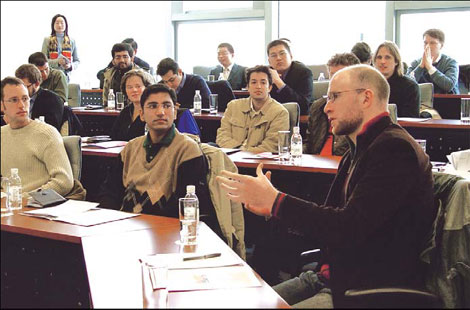Overseas training helps officials
 0 Comment(s)
0 Comment(s) Print
Print E-mail
China Daily, June 29, 2011
E-mail
China Daily, June 29, 2011
An increasing number of Communist Party of China (CPC) officials are attending overseas training programs to learn governance skills amid the Party's intensified efforts to rule a country in transition.
 |
|
Foreign teachers at the Shanghai-based China Executive Leadership Academy Pudong (CELAP), during a class discussion on March 5, 2005. |
According to the State Administration of Foreign Expert Affairs, more than 30 countries and regions provide overseas training to Chinese officials from both central and local governments.
On the national level, about 414 officials have taken part in one of the country's largest training programs since 2002.
Participants, mostly director-level officials with some minister-level ones, fly to Harvard University to attend classes covering public health, energy strategy, housing policy, emergency management and others, after completing a three-week course in public policy and management at China's elite Tsinghua University.
Overseas training programs are also popular with local officials, as those who complete the training courses are usually seen as promising candidates for high-ranking positions.
The government of Dongcheng district in Beijing pledged to send at least 20 percent of its civil servants for training abroad by 2030. The district government's training program has a budget of at least 50 million yuan ($7.5 million) a year, with the sum likely to increase year-on-year.
Mao Shoulong, director of the administrative management department at Renmin University of China, told China Daily that although the cost seems high, the benefits are worth it.
"Overseas training is necessary since the market economy and the country's opening-up require officials to be equipped with modern governance skills," Mao said.
He suggested that the government should be open about the cost of such training and establish a system to evaluate the effectiveness of such training.
"The public are entitled to know how the money is used, and what the officials have learned from the training," Mao said, adding it is hard to evaluate the effectiveness of such programs, since what the officials learn are mostly intangible skills.
However, such programs, which may not generate visible results in the short term, will influence these officials unconsciously in the long run, he said.
More than 90 percent of minister-level officials have received training overseas, according to World Vision, a magazine under the Ministry of Foreign Affairs.
"The large proportion of officials with overseas training experience doesn't necessarily mean that such programs are shortcuts to higher positions. It is possible that the government sends the officials abroad so they become more capable," Mao said.






Go to Forum >>0 Comment(s)